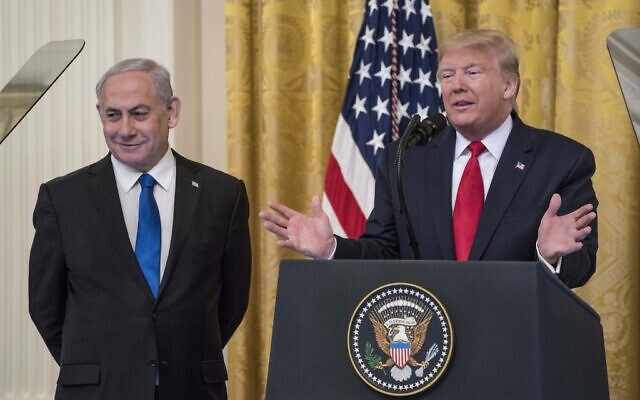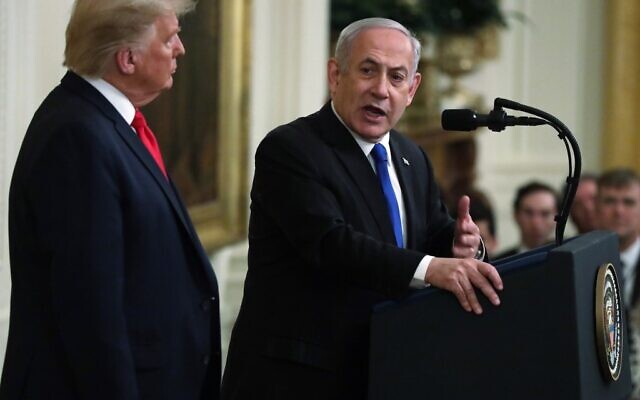T. Belman. This survey was done before the Deal was released. It only asked if they would accept the Plan if it included the creation of a Palestinian state. That is not the case. No mention was made about what israel might get from the deal or any possible restrictions on the state. I fully expect greater support for the Deal now that its details are known.
The Deal does not require acceptance by any side though Trump has said he would like approval. Since Trump has said on many occasions that settlements are not illegal and that israel has the legal and historical claims to the land, I see not impediment to Israel extending sovereignty not because of the deal but because they have the right to. At the same time, she can indicate that she is open to considering the provisions of the Deal. That’s far from expressing approval of the creation of a Palestinian state.
If peace plan requires recognizing a Palestinian state, 45.3% said Israel should go ahead, 38.1% oppose the idea; half the population see release of plan as election interference
By TOI STAFF

US President Donald Trump and Israeli Prime Minister Benjamin Netanyahu participate in a joint statement in the East Room of the White House, in Washington, DC, on January 28, 2020. (Sarah Silbiger/Getty Images/AFP)
More Israelis think the country should agree to a Trump administration peace plan that includes recognition of a Palestinian state than those who oppose the creation of a state under the plan, according to a survey published Monday.
The Israeli Voice Index poll was conducted before US President Donald Trump unveiled his peace proposal in Washington last week, but it asked respondents about willingness to recognize a Palestinian state on the assumption that such a condition would be included in the plan.
While 45.3% would accept the condition of recognizing a Palestinian state, 38.1% said Israel should not agree, according to the poll, a monthly survey conducted by the Israel Democracy Institute think tank in Jerusalem.
Overall support among all Jewish respondents was at 45.5%, nearly the same as the 44% overall support among Arabs.
The relatively low support among Arabs may stem from skepticism over the Trump administration’s intentions and Washington’s feud with the Palestinian Authority leadership in Ramallah, the study’s authors speculated.
Nearly half of respondents (49.9%) — and a clear majority among Arab citizens (68%) — said that the timing of Trump rolling out his plan, barely six weeks before elections in Israel, was interfering in the vote to support Prime Minister Benjamin Netanyhau with his campaign for the March 2 vote.
Among the Jewish population 46% felt Washington was trying to help Netanyahu. But among left-wing Jews fully 78% were certain the timing of its release was meant to help Netanyahu. The figure was also high, 69%, among self-identified centrist Jews, but much lower, just 33.5%, among right-wing Jews.
Prime Minister Benjamin Netanyahu (R) speaks during a press conference with US President Donald Trump in the East Room of the White House on January 28, 2020, in Washington. (Alex Wong/Getty Images/AFP)<
>
<
>
Israel is heading to its third elections within a year after votes in April and September failed to break a political deadlock and produce a government.
Yet, “in a segmentation by voting in the most recent elections, the greatest support for the Trump plan, which includes recognition of a Palestinian state, turns out to be among the parties of the left and the center, while most of the voters for the right-wing parties and the Haredi [ultra-Orthodox] parties oppose the plan,” said the authors.
Support was highest among those who voted in September for the progressive Democratic Camp (79 percent), and very high among left-wing Labor-Gesher (67%) and centrist Blue and White (65%) voters. Support was at the halfway point among right-wing secularist Yisrael Beytenu voters (51%) and less than half among voters for the Arab-majority Joint List (44%), the Haredi Ashkenazi party United Torah Judaism (33%), center-right Likud (33%), right-wing Yamina (23.5%) and the Haredi Sephardi party Shas (23%).
That might explain Netanyahu’s unexpected political trouble after what he billed as a “historic” unveiling of the peace plan last week in Washington — only to see growing opposition to the American proposal among Likud cabinet ministers and his right-wing base.
Although prediction polls in Hebrew media have shown the Blue and White party opening a slight lead over rivals Likud, the IDI survey found that Netanyahu still has the most support to lead Israel into peace negotiations.
Asked who would conduct negotiations better, 45.5% backed Netanyahu compared to 21.1% for Gantz with 20.2% responding that they would be about the same. The remaining 13.2% either didn’t know or declined to answer.
The study also found a plurality of Israelis saying the deciding factor in the election would be the criminal indictments looming over Netanyahu — a view espoused by 32% of Israelis, followed by 21% who saw cost-of-living and housing prices as the primary issue, 18% who said security, 10% who said religion and state and 7% who said relations between Arabs and Jews.
The study’s authors noted those figures marked a sharp shift in the Israeli public’s sense of what would drive voters to the polls. Ten months ago, ahead of the April 2019 election, the Israeli Voice Index survey found a plurality of 30% cited security concerns as being the most influential factor in the election, followed by economic issues (22%) and Netanyahu’s criminal probes at third place with 19%.
“Clearly, the decision to indict Netanyahu and the public discourse surrounding Netanyahu’s investigations have left their mark,” the IDI said.
An Israeli man holds his dog while casting his ballot at a polling station in Rosh Haayin, on September 17, 2019. (Jack GUEZ / AFP)<
>
<
>
The survey also found that nearly over a third of the public don’t trust the results of elections.
“We have been gauging to what extent Israelis think the election results as publicized match the actual voting or are manipulated in one way or another in the official reporting,” the authors wrote. ” The rate of those who do not believe in the propriety of the Israeli elections, that is, that the official reporting of the results matches the actual voting, stands this month at 39%. On average, this rate since March 2019 has come to about one-third (35%).”
[..] Support for a two-state solution to the Israeli-Palestinian conflict has hovered around the 43% among Palestinians and Israeli Jews for the past two years, its lowest level in two decades.





Leave a Reply
You must be logged in to post a comment.